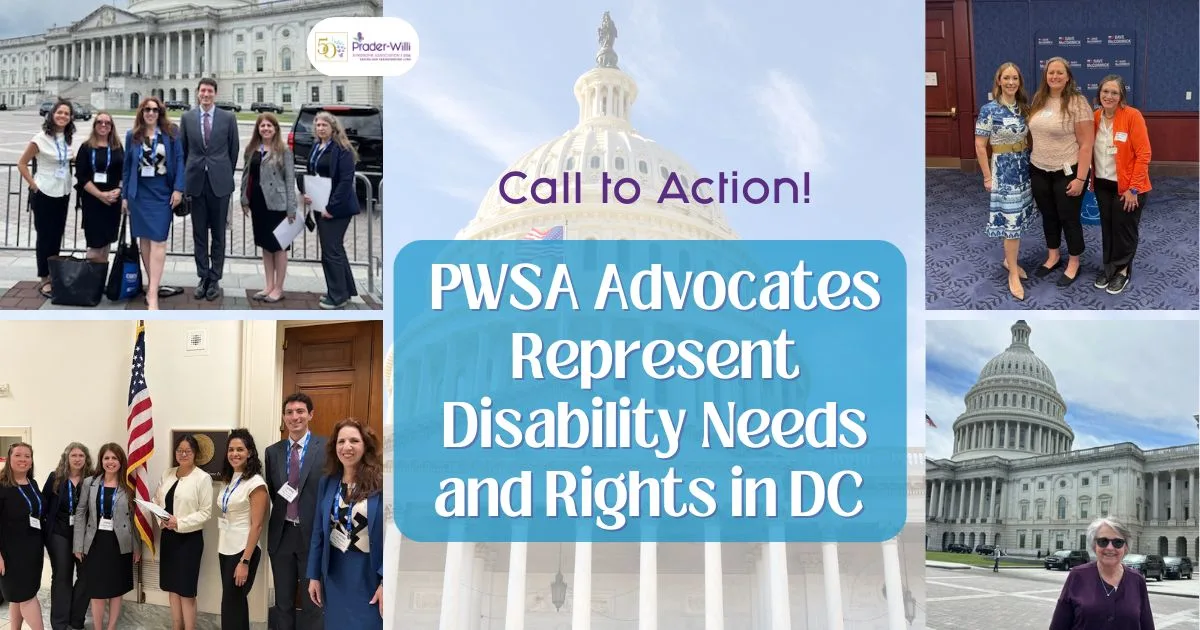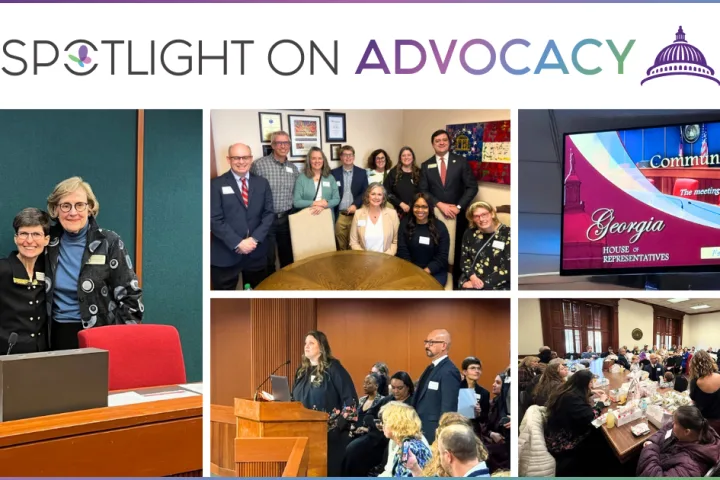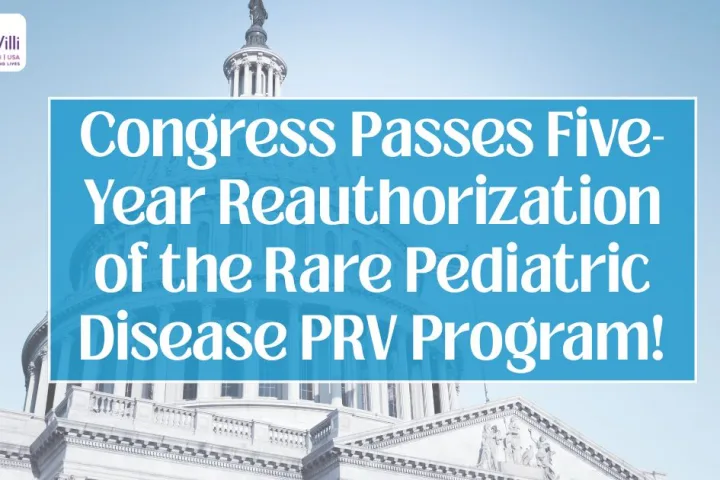submitted by Dorothea Lantz, PWSA | USA’s Director of Community Engagement
PWSA | USA Advocacy Community Update – Capitol Hill Recap (May 5–8, 2025)
From May 5th–8th, six of our PWSA | USA Advocacy Ambassadors joined forces with the Council of Parent Attorneys and Advocates (COPAA) and key partners from the rare disease industry to advocate for critical issues affecting individuals with Prader-Willi syndrome (PWS) and the broader rare disease community on Capitol Hill.
Over the course of several days, our ambassadors met with members of Congress and their staff to advance the following priorities:
Protecting Medicaid for Individuals with Disabilities
Medicaid is a lifeline for many in the PWS community, providing access to critical health services, therapies, and long-term supports. Proposed cuts or restructuring threaten continuity of care and services that individuals with PWS rely on every day. We urged legislators to reject any proposals that would reduce Medicaid funding or impose block grants or per-capita caps, which disproportionately harm people with complex medical needs.
Preserving Federal Education Funding
Access to inclusive, individualized education is vital for children with PWS. We advocated to preserve and enhance federal funding for IDEA (Individuals with Disabilities Education Act) and other special education programs. These programs support tailored learning plans, assistive technology, and classroom support that are often necessary for students with PWS to succeed in school settings.
Safeguarding the Rare Pediatric Disease Priority Review Voucher (PRV) Program
The PRV program incentivizes pharmaceutical companies to develop treatments for rare pediatric diseases like PWS by granting expedited review vouchers. These vouchers are a crucial tool to encourage research and development in areas that might otherwise be overlooked due to small patient populations. As the program faces potential sunset or reform, we pushed for its preservation and strengthening.
Supporting the Orphan Drug Tax Credit (ODTC)
The ODTC helps offset the high costs of developing therapies for rare diseases, offering a tax credit for clinical testing of orphan-designated drugs. This program has directly contributed to the development of treatments for rare conditions—but it has been under threat in recent years. We stressed the need to maintain and bolster the ODTC to ensure continued innovation and hope for our community.
Why This Matters for PWS Families
Policy decisions made in Washington, D.C. have a direct impact on our daily lives—from the medications our loved ones can access, to the therapies they receive, to the educational supports they depend on. It is more important than ever that the PWS community remain engaged as these issues progress through Congress.
Advocacy doesn’t end after a meeting—it requires persistent storytelling, relationship-building, and a united voice from families like yours. Whether you’re new to advocacy or a seasoned advocate, your voice is powerful.
We’re incredibly proud of our ambassadors and thankful to our partners for amplifying the needs of our community on a national stage. Stay tuned for upcoming action alerts and opportunities to get involved!
Call to Action
Share Your Story, Strengthen Our Voice
One of the most powerful tools we have in advocacy is your story. Personal experiences help lawmakers understand the real-world impact of their decisions. We invite you to share your PWS journey with us using the link below. Stories submitted will be shared with elected officials to drive home the urgent need for support and services.
Help Expand Disability Services for PWS – Share Your Story
Together, we can shape a future where people with PWS and rare diseases are heard, supported, and empowered.
Share this!





 Perry A. Zirkel has written more than 1,500 publications on various aspects of school law, with an emphasis on legal issues in special education. He writes a regular column for NAESP’s Principal magazine and NASP’s Communiqué newsletter, and he did so previously for Phi Delta Kappan and Teaching Exceptional Children.
Perry A. Zirkel has written more than 1,500 publications on various aspects of school law, with an emphasis on legal issues in special education. He writes a regular column for NAESP’s Principal magazine and NASP’s Communiqué newsletter, and he did so previously for Phi Delta Kappan and Teaching Exceptional Children. Jennifer Bolander has been serving as a Special Education Specialist for PWSA (USA) since October of 2015. She is a graduate of John Carroll University and lives in Ohio with her husband Brad and daughters Kate (17), and Sophia (13) who was born with PWS.
Jennifer Bolander has been serving as a Special Education Specialist for PWSA (USA) since October of 2015. She is a graduate of John Carroll University and lives in Ohio with her husband Brad and daughters Kate (17), and Sophia (13) who was born with PWS. Dr. Amy McTighe is the PWS Program Manager and Inpatient Teacher at the Center for Prader-Willi Syndrome at the Children’s Institute of Pittsburgh. She graduated from Duquesne University receiving her Bachelor’s and Master’s degree in Education with a focus on elementary education, special education, and language arts.
Dr. Amy McTighe is the PWS Program Manager and Inpatient Teacher at the Center for Prader-Willi Syndrome at the Children’s Institute of Pittsburgh. She graduated from Duquesne University receiving her Bachelor’s and Master’s degree in Education with a focus on elementary education, special education, and language arts. Evan has worked with the Prader-Willi Syndrome Association (USA) since 2007 primarily as a Crisis Intervention and Family Support Counselor. Evans works with parents and schools to foster strong collaborative relationships and appropriate educational environments for students with PWS.
Evan has worked with the Prader-Willi Syndrome Association (USA) since 2007 primarily as a Crisis Intervention and Family Support Counselor. Evans works with parents and schools to foster strong collaborative relationships and appropriate educational environments for students with PWS. Staci Zimmerman works for Prader-Willi Syndrome Association of Colorado as an Individualized Education Program (IEP) consultant. Staci collaborates with the PWS multi-disciplinary clinic at the Children’s Hospital in Denver supporting families and school districts around the United States with their child’s Individual Educational Plan.
Staci Zimmerman works for Prader-Willi Syndrome Association of Colorado as an Individualized Education Program (IEP) consultant. Staci collaborates with the PWS multi-disciplinary clinic at the Children’s Hospital in Denver supporting families and school districts around the United States with their child’s Individual Educational Plan. Founded in 2001, SDLC is a non-profit legal services organization dedicated to protecting and advancing the legal rights of people with disabilities throughout the South. It partners with the Southern Poverty Law Center, Protection and Advocacy (P&A) programs, Legal Services Corporations (LSC) and disability organizations on major, systemic disability rights issues involving the Individuals with Disabilities Education Act (IDEA), Americans with Disabilities Act (ADA), and the federal Medicaid Act. Recently in November 2014, Jim retired.
Founded in 2001, SDLC is a non-profit legal services organization dedicated to protecting and advancing the legal rights of people with disabilities throughout the South. It partners with the Southern Poverty Law Center, Protection and Advocacy (P&A) programs, Legal Services Corporations (LSC) and disability organizations on major, systemic disability rights issues involving the Individuals with Disabilities Education Act (IDEA), Americans with Disabilities Act (ADA), and the federal Medicaid Act. Recently in November 2014, Jim retired.